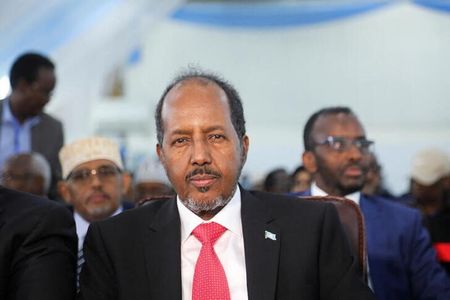By Duncan Miriri
NAIROBI (Reuters) – The International Monetary Fund has prolonged support for Somalia under its Extended Credit Facility to Aug. 17, giving itself time to consult with an incoming government, the lender said on Friday.
The move follows election of a new president on Sunday and a request from the Somali government early this month for a three-month extension in financial support.
In February, the IMF warned the three-year budget support programme, worth nearly $400 million, would expire automatically if delays in legislative and presidential elections prevented a new government taking office in time for a review of the package by May 17.
“The extension will provide the time needed to confirm policy understandings with the new government and confirm financing assurances with development partners,” the fund told Reuters.
Somalia’s lawmakers elected former leader Hassan Sheikh Mohamud on Sunday as the new president, ending more than a year of delays to the vote after incumbent President Mohamed Abdullahi Mohamed tried to extend his four-year term by two years.
Parliament thwarted his move.
Mohamud will take office from Mohamed on Monday.
The IMF said in a separate statement late on Thursday its staff and Somali authorities had reached a staff-level agreement on their second and third reviews of the programmes under the facility.
Whether the facility will be extended beyond August is a matter for the IMF’s executive board.
“The IMF will work with the authorities to bring the review under the Extended Credit Facility (ECF) arrangement for IMF Executive Board consideration in the coming weeks,” the fund told Reuters.
The IMF forecast Somalia’s economy would expand by 2.7% this year, down from 3.2% forecast in February but higher than the 2% achieved in 2021.
“Growth is expected to pick up modestly in 2022, but risks are elevated.
Growth of 2.7 percent would be driven by private consumption, supported by remittances,” the IMF said in its Thursday statement.
“However higher international food and fuel costs will dampen economic activity ….”
(Reporting by Duncan Miriri; Writing by George Obulutsa; Editing by Clarence Fernandez and Bradley Perrett)








